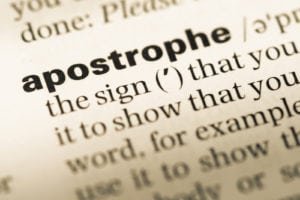At the Ideal Marketing Company, we always recommend you use a professional copywriter for web content, direct mail, press releases and other important business communications. However, this may not always be possible, for example if you urgently need to update your website with an important piece of news. 
One of the trickiest areas to navigate is the apostrophe. Many large businesses get this wrong on communications and signage, so it’s little wonder many people are left confused about the rules. But if you follow this guide, you’ll be on track with this tiny but troublesome punctuation mark.
Possessives
One of the most common uses of the apostrophe is to show that something belongs to someone or something:
- The dog’s water bowl.
The water bowl belongs to one dog. When more than one dog owns the water bowl, the apostrophe goes after the ‘s’ to denote the plural:
- The dogs’ water bowl.
This rule is also applied when talking about time in a possessive form:
- I’m taking a month’s worth of holiday in one go.
- Sarah has eight months’ experience as a dentist.
Here, the apostrophe goes before the ‘s’ when we are only talking about just one month, but after it when we are referring to more than one month.
When the Hugh Grant film ‘Two Weeks Notice’ came out, there were complaints about the lack of apostrophe in ‘weeks’ as the grammatically correct phrase is ‘Two Weeks’ Notice’. Apostrophes are often mistakenly missed out, but it’s becoming more and more common for them to be deliberately omitted, often by designers who like clean lines! This causes confusion and leads to the omission of apostrophes being more acceptable. But if you want to be correct it’s always ‘two weeks’ notice’.
Plural common nouns
It’s important to know the rules for the plural form of common nouns:
- The woman’s changing room (a changing room for one woman)
- The women’s changing room (a changing room for multiple women)
We would not write ‘womens’’ as the fact we have written ‘women’ instead of ‘woman’, shows we are talking about more than one female. Going back to the earlier example, there is no plural form of the word ‘dog’, which is why ‘dogs’’ is used to signal the possessive plural form of the word ‘dog’.
Contractions
Another common use of the apostrophe is to shorten two words to make one in informal writing:
- I don’t want to go to the shops today (shortened version of ‘do not’).
- We’ll get back to you with a quote (shortened version of ‘we will’).
Less commonly, contractions can involve three words:
- She’d’ve bought a ticket if she’d known about the gig (shortened version of ‘she would have’)
Although she’d’ve is grammatically correct, it looks a little strange due to the fact that it’s a phrase often said but rarely written. So we recommend using the more formal ‘she would have’ in writing.
When writing for business, people are often unsure whether to use contractions or opt for a more formal approach. For example:
- We are offering a discount for two days only – formal
- We’re offering a discount for two days only – informal
The form you choose will depend on personal preference and the nature of your communication and your business. However, contractions are generally acceptable these days on all but the most formal of communications. The key is to be consistent – don’t write ‘we’re offering a discount’ at the top of the page and then ‘we are looking forward to hearing from you’ further down.
Making it clear
Apostrophes are also sometimes used to provide clarity:
- He bcc’d Karen into the email.
- Do you know all the do’s and don’ts about where to put an apostrophe?
- Dot your i’s and cross your t’s.
Here, writing ‘is’ instead of ‘i’s’ is confusing as the sense is changed and writing ‘ts’ looks strange. However, leaving the apostrophe out is grammatically correct here, so it’s a matter of personal taste and again, keeping it consistent.
Its and It’s
Personal pronouns (words like his, hers, ours and theirs) are already possessive so they don’t need an apostrophe. Going back to our dog example:
- The dog’s water bowl.
But if you want to refer to the dog with a personal pronoun you write:
- Its water bowl.
The apostrophe in ‘it’s’ should only ever be used as a contraction:
- It’s not fair that you took its bowl away.
So all you have to do is ask yourself if you are meaning to say ‘it is’ or not? Doing this eliminates common mistakes in sentences such as:
- Please put the chair back in its proper place.
You are not saying ‘it is’ here, so there is no apostrophe.
Your and You’re
Again, the apostrophe is only ever used as a contraction:
- You’re going to look great in that dress.
- Your dress looks great.
If you can’t lengthen the phrase to ‘you are’, always use the possessive adjective, ‘your’.
Avoid pitfalls
A widespread mistake (often made by big brands) is to add apostrophes to plurals:
- Drink’s and snack’s available is WRONG
- Drinks and snacks available is CORRECT
- CD’s and DVD’s for sale is WRONG
- CDs and DVDs for sale is CORRECT
There is no need here to use the apostrophe to provide clarity as in the ‘do’s and don’ts’ example above.
Again, only use apostrophes on common nouns to show possession:
- The CD’s case has broken.
- The DVDs’ box has gone missing.
What’s in a name?
People also often mistakenly add apostrophes to plural names:
- The Robinson’s are coming for dinner is WRONG
- The Robinsons’ are coming for dinner is WRONG
- The Robinsons are coming for dinner is CORRECT
Only use an apostrophe in a name when you are using the possessive form:
- The Robinsons’ car has broken down so they can’t make dinner.
But what happens when a name ends in ‘s’? When the film Bridget Jones’s Baby came out, there was a debate as to whether it should actually have been ‘Bridget Jones’ Baby.’
Both can be considered correct, but the best way to solve this dilemma is to say the phrase out loud to see if you pronounce the final ‘s’:
- Bridget Jones’s Baby (an ‘s’ is added because you say ‘JonesZIZ’)
- The Rolling Stones’ new song (an ‘s’ is not added because you don’t say StonesZIZ)
Apostrophe errors happen and are not the end of the world, but running through these rules in your head as well as using spelling/grammar checkers (which are not fool proof), will make you an apostrophe ace in no time!
To find out more about our copywriting services, please email info@idealmarketingcompany.com or call us on 01858 374 170.

Louise is an experienced and versatile copywriter whose passion is bringing any subject to life through the written word. She thrives on using her imaginative approach to identify and implement exciting PR opportunities for clients. A career spent coming up with creative content for tight deadlines in consumer magazine journalism and PR means Louise doesn’t know the meaning of the term ‘writer’s block!’







